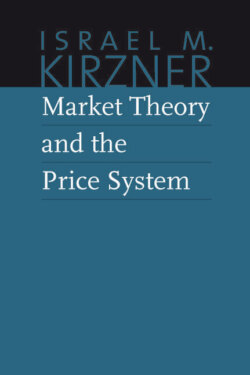Читать книгу Market Theory and the Price System - Israel M. Kirzner - Страница 12
На сайте Литреса книга снята с продажи.
THE INDIVIDUAL AND THE MARKET
ОглавлениеSociety consists of individual human beings. Each human being is eager to act to improve his position, whenever this appears possible. In order to satisfy his desires, a man may act on his own (as, for example, when he paints his house by himself), or he may fulfill his ends indirectly through exchange (as when he pays another man to do the painting). Where an exchange transaction takes place freely, the two individuals involved have both acted to fulfill separately their respective goals.
In a predominantly free society, individuals are in most respects at liberty to act as they choose. That is, in such a society an individual is generally at liberty to take advantage of any opportunity (as he perceives the existence of such an opportunity) in order to improve his position (as he understands the idea of improving his position). He is free to act in isolation, and he is free to engage in acts of exchange with other individuals (whenever he and some other individuals both perceive the opportunity of mutual benefit through trade). As we shall find, such opportunities for mutually advantageous exchange arise constantly in society. Moreover, the exploitation by individuals of these opportunities opens up yet further opportunities of the same kind, both to the individuals themselves and to others in the society. A market exists whenever the individual members of a society are in sufficiently close contact to one another to be aware of numerous such opportunities for exchange and, in addition, are free to take advantage of them. A market economy exists wherever the ramifications of the market become so widespread and the opportunities it offers so numerous and attractive that most individuals find it advantageous to carry on their economic activities predominantly through the market rather than on their own.
The market economy is thus to be distinguished, on the one hand, from the autarkic economy, where individuals carry on their economic activity isolated from one another, being unaware or unwilling to take advantage of opportunities for exchange. On the other hand, it is to be distinguished from the centrally controlled economy where economic activity of individuals is directed by a central authority so that, although transfers of goods among individuals may be ordered by the central authority, individuals are not free to take advantage of exchange opportunities which they themselves may perceive. It is unlikely that any one of these three types of economies will exist historically in its theoretically purest form. To some extent, limited market activity is likely to arise even in the most primitive and autarkic of societies, whereas even the most rigid of centrally controlled economies leaves room, legally or illegally, for some market-type activity between individuals. Finally, even the most fully developed market economy is incapable of making it advantageous for individuals to seek the satisfaction of all their wants exclusively through the market. (Most men, for example, turn to the market for a haircut but not for a shave.)
In the developed market economy, the conditions of production have become adjusted to the market requirements. Over a period of time, individuals acting through the market have succeeded in setting up an organization of production and exchange which, in turn, has widened the market until it has embraced the bulk of all economic activity in the society. In such a system, as in any system where the individual is relatively free to act as he pleases, men seek to improve their positions with the means at their disposal. But, whereas the isolated individual can improve his position only by adjusting himself to, and manipulating, the conditions imposed by nature, in the market economy the individual acts to take advantage also of the conditions and opportunities made available by the market.
The salient fact that emerges from this discussion is that any description of market activity means the description of individual activity, but also that the activity of each participating individual in the market is conditioned by the actions of other participating individuals (either in the past or as anticipated in the future). It is this insight, we will discover, that is the basis for the economic analysis of the market system and of the processes that take place in the market.
